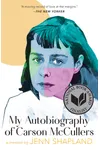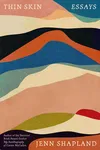Picture an American writer who weaves personal stories with literary detective work—meet Jenn Shapland! Based in the vibrant landscapes of New Mexico, this archivist-turned-author has carved a unique space in nonfiction with her genre-bending debut, My Autobiography of Carson McCullers. With a knack for uncovering hidden truths and a voice that’s both introspective and bold, Shapland’s work challenges how we see history, identity, and the stories we tell ourselves.
Her writing doesn’t just inform—it sparks curiosity, blending rigorous research with raw, relatable emotion. From prestigious awards to teaching the next generation of writers, Jenn Shapland is a literary force redefining memoir and biography with a queer, feminist lens. Ready to dive into her world?
The Making of Jenn Shapland
Jenn Shapland grew up with a love for stories, a passion that led her to earn a PhD in English from the University of Texas at Austin. Her career began in the quiet, dusty corners of archives, where she worked as an intern at the Harry Ransom Center, handling the personal effects of literary giants. It was here, surrounded by letters and artifacts, that Shapland found her calling—not just as an archivist but as a writer who could breathe life into forgotten narratives. Her early essays, published in outlets like Tin House and The Millions, hinted at her talent for blending the personal with the profound.
Jenn Shapland’s Unforgettable Stories
Shapland’s debut, My Autobiography of Carson McCullers (2020), is a masterpiece of hybrid nonfiction. Part memoir, part biography, it explores the queer identity of Southern author Carson McCullers, whose love letters to women Shapland discovered in the archives. The book’s nonlinear structure and intimate tone invite readers into both McCullers’ world and Shapland’s own journey as a queer woman, earning it a National Book Award nomination and the 2021 Lambda Literary Award for Lesbian Memoir.
In 2023, Shapland released Thin Skin, a collection of essays that delve into environmental toxicity, capitalism, and human vulnerability. With a style that’s both lyrical and incisive, she connects personal experiences—like her own dermatologic sensitivity—to broader issues, such as nuclear legacies in New Mexico. Her essays, including the Pushcart Prize-winning “Finders, Keepers” (2017), showcase her ability to make the mundane profound, whether she’s writing about archives or identity.
Shapland’s work stands out for its refusal to conform to traditional genres. She writes with a detective’s curiosity and a poet’s heart, challenging readers to rethink history and their place in it. Her focus on queer and feminist perspectives adds depth, making her a vital voice in contemporary nonfiction.
Why Jenn Shapland Matters
Jenn Shapland’s impact lies in her ability to uncover stories that have been overlooked or erased, particularly those of queer women. By reexamining Carson McCullers’ life through a modern lens, she’s reshaped how we understand literary history, proving that biography can be personal and transformative. Her work resonates with readers who crave authenticity, inspiring writers to blend memoir with research in bold new ways. As an adjunct instructor at the Institute of American Indian Arts, she’s also shaping the next generation of storytellers.
Beyond her books, Shapland’s essays spark conversations about identity, environment, and the power of archives. Her voice—thoughtful yet accessible—invites us to question narratives and seek truth in the fragments of the past.
About Jenn Shapland
- Key Works: My Autobiography of Carson McCullers (2020), Thin Skin (2023)
- Awards: Lambda Literary Award (2021), Pushcart Prize (2017), National Book Award Finalist (2020)
- Profession: Writer, archivist, adjunct instructor at the Institute of American Indian Arts
- Location: Santa Fe, New Mexico
Snag My Autobiography of Carson McCullers or Thin Skin and dive into Jenn Shapland’s genre-defying world of queer history, personal discovery, and literary magic!

